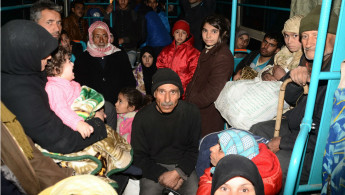Displaced Syrians seek official documents in regime-run Aleppo
Displaced Syrians seek official documents in regime-run Aleppo
Aleppo residents have begun registering for official documents for the first time in four years after the Syrian regime recaptured the city from rebels last month.
3 min read
Refugees from Aleppo have struggled to register [Getty]
Syrians returning to war-ravaged Aleppo are able to register births, deaths and marriages for the first time since rebels took control of the city four years ago.
A Syrian non-governmental organisation and the UN refugee agency, UNHCR, have set up an office at a shelter for displaced people just south of Aleppo so the displaced can obtain government certificates or new identity cards.
A Syrian non-governmental organisation and the UN refugee agency, UNHCR, have set up an office at a shelter for displaced people just south of Aleppo so the displaced can obtain government certificates or new identity cards.
Syrian rebels took control of large parts of east Aleppo in July 2012, and for more than four years residents in rebel-held areas were not able to register themselves because the regime had no presence.
Those who registered themselves at courthouses or local offices run by the rebels received documents that are not recognised by the Syrian government.
In December, government forces captured all of eastern Aleppo, after a devastating Russian-backed offensive which killed hundreds of civilians, sparked protests in solidarity and was internationally condemned
Thousands of impoverished east Aleppo residents left their neighbourhoods and moved to nearby areas and sheltered in villages.
One of those is 22-year-old Fatima Museitif, who got married three years ago and soon gave birth to two boys.
Her husband died last year but since she was living in a rebel-held eastern neighbourhood of Aleppo, she couldn't obtain a marriage certificate, a death certificate for her husband or birth certificates for her children.
Many of those who left are, like Museitif, living without official documents - making their movement difficult in a country where security is extremely tight amid a war now in its sixth year.
In Jibreen, the Free Legal Support Program that is run by UNHCR and the Syrian Trust for Development - a local NGO that was established by Assad's wife Asma - is processing paperwork four days a week.
Fatima Akkam, a lawyer who works at the office said that since late last year, the Jibreen office has registered some 500 legal cases — mostly new identity cards to replace lost or damaged ones or to register marriages or births.
She said another 900 cases are currently being processed. In addition to the Jibreen office, there are six offices in Aleppo and nearby villages — raising the number of cases into the thousands.
Sobhi Deebo, a lawyer and official at the office, said most of those seeking documents come as a group that knows one another, which helps with the identification process.
"They know that this child belongs to this specific family. Those people are coming here as witnesses for the birth certificates, identification cards," Deebo said. "These are our first steps to offer this service."
Since the war began in March 2011, half of all Syrians have been forced to leave their homes, and 6.3 million are internally displaced, making Syria the largest displacement crisis globally.
Those who registered themselves at courthouses or local offices run by the rebels received documents that are not recognised by the Syrian government.
In December, government forces captured all of eastern Aleppo, after a devastating Russian-backed offensive which killed hundreds of civilians, sparked protests in solidarity and was internationally condemned
Thousands of impoverished east Aleppo residents left their neighbourhoods and moved to nearby areas and sheltered in villages.
One of those is 22-year-old Fatima Museitif, who got married three years ago and soon gave birth to two boys.
Her husband died last year but since she was living in a rebel-held eastern neighbourhood of Aleppo, she couldn't obtain a marriage certificate, a death certificate for her husband or birth certificates for her children.
Many of those who left are, like Museitif, living without official documents - making their movement difficult in a country where security is extremely tight amid a war now in its sixth year.
In Jibreen, the Free Legal Support Program that is run by UNHCR and the Syrian Trust for Development - a local NGO that was established by Assad's wife Asma - is processing paperwork four days a week.
Fatima Akkam, a lawyer who works at the office said that since late last year, the Jibreen office has registered some 500 legal cases — mostly new identity cards to replace lost or damaged ones or to register marriages or births.
She said another 900 cases are currently being processed. In addition to the Jibreen office, there are six offices in Aleppo and nearby villages — raising the number of cases into the thousands.
Sobhi Deebo, a lawyer and official at the office, said most of those seeking documents come as a group that knows one another, which helps with the identification process.
"They know that this child belongs to this specific family. Those people are coming here as witnesses for the birth certificates, identification cards," Deebo said. "These are our first steps to offer this service."
Since the war began in March 2011, half of all Syrians have been forced to leave their homes, and 6.3 million are internally displaced, making Syria the largest displacement crisis globally.


![President Pezeshkian has denounced Israel's attacks on Lebanon [Getty]](/sites/default/files/styles/image_684x385/public/2173482924.jpeg?h=a5f2f23a&itok=q3evVtko)



 Follow the Middle East's top stories in English at The New Arab on Google News
Follow the Middle East's top stories in English at The New Arab on Google News


